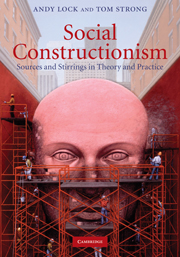Book contents
- Frontmatter
- Contents
- Preface
- Acknowledgements
- 1 Introduction
- 2 Giambattista Vico
- 3 Phenomenology
- 4 Hermeneutics
- 5 Marxism and language
- 6 Lev Vygotsky
- 7 Meanings and perspectives
- 8 Ludwig Wittgenstein
- 9 Gregory Bateson
- 10 Sociologies – Micro and Macro
- 11 Sources of the self
- 12 Michel Foucault and his challenges
- 13 Discourse analysis
- 14 Ken and Mary Gergen
- 15 Rom Harré
- 16 John Shotter
- 17 Concluding remarks
- Bibliography
- Index
8 - Ludwig Wittgenstein
‘Shewing the fly out of the bottle’
Published online by Cambridge University Press: 05 June 2012
- Frontmatter
- Contents
- Preface
- Acknowledgements
- 1 Introduction
- 2 Giambattista Vico
- 3 Phenomenology
- 4 Hermeneutics
- 5 Marxism and language
- 6 Lev Vygotsky
- 7 Meanings and perspectives
- 8 Ludwig Wittgenstein
- 9 Gregory Bateson
- 10 Sociologies – Micro and Macro
- 11 Sources of the self
- 12 Michel Foucault and his challenges
- 13 Discourse analysis
- 14 Ken and Mary Gergen
- 15 Rom Harré
- 16 John Shotter
- 17 Concluding remarks
- Bibliography
- Index
Summary
Philosophy is a battle against the bewitchment of our intelligence by means of language.
(Wittgenstein, 1953: aphorism 109)The myth of the given in modern philosophy of language involves as profound an alienation from the human world as that of classical empiricism from the natural world.
(Hacker, 2000: 48)It is surprising that Wittgenstein has not featured more prominently in social constructionist writings about practice. His intellectual journey paralleled those of practitioners who began their careers bent on universal truths and practices, but ended up more humbly basing their practice on contextualized meanings used in language. If that journey seems familiar, Wittgenstein also brought exacting analytic rigour to his journey and we are the richer for his efforts. But, reading Wittgenstein … well, that is perhaps why more constructionist practitioners don't cite his influence.
Ludwig Wittgenstein championed two nearly opposing approaches to philosophy: an analytic and an idealized view that language could correctly represent experience; and a focus on people's use of everyday forms of language. Both ways, Wittgenstein took us further into the reality–language connection. His efforts began with an attempt on the ultimate word for what Hacker above described as the ‘myth of the given’, only to abandon this project to consider how all forms of language can bewitch or optimally serve human understanding and interaction.
Wittgenstein's aims were practical and therapeutic. For him, philosophy was a challenge of ‘shewing the fly out of the bottle’ – the bottle being limitations in how we use language.
- Type
- Chapter
- Information
- Social ConstructionismSources and Stirrings in Theory and Practice, pp. 141 - 169Publisher: Cambridge University PressPrint publication year: 2010
- 1
- Cited by



